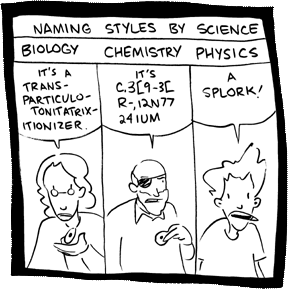Army of GOD wrote:InkL0sed wrote:It matters because language is for communication. Saying "God Particle" communicates something different than "Higgs boson". Especially since "God Particle" is actually a nickname that's longer than the actual name. Sometimes nicknames are just a shorter version of the real name, and they only exist for efficiency of communication. That's certainly not the case here. If you say "God Particle" instead of "Higgs boson", you're intentionally communicating something different. In most cases, it's because you're in the media and you're adding that implication because you want to sensationalize the story. If you're not, it's probably because you're uninformed.
If you want to communicate to people that you think the Higgs boson is godly, or that you're simply uninformed enough to believe something like that, then fine, use it. I'm not saying you can't do that. But understand how you'll be perceived if you do.
And your example of Lebron James and "king" is fallacious, because people use the word "king" in that context not to mean a monarch, but to mean that he's the best or greatest. People do usually say that to mean he's the best or greatest player, or whatever it is the person is (like Michael Jackson as the "King of Pop" for instance). Or if that's not what they mean, it's certainly what people understand.
I'm going to have to disagree with the underlined.
And nicknames aren't just for efficiency. I have several nicknames and many of them are longer than my actual name/the shortened version of my name (Richard/Rich). One of my nicknames is "Big Dick" (you know, because I have a large penis [but really because it's moronically amusing {"big"} and because another name for Rich is Dick]).
I'm sure there are people who think the Higgs boson is actually godly or whatever, but there are also people who think Jesus lived at the same time as dinosaurs, so that means very little. Calling the other group of people "uninformed" is a bit ridiculous. Maybe it's just more fun to say?
And if you want to be this nitpicky about "communication" then good luck with the entirety of colloquial language. People use the word "god" to refer to people who are really good/the best at something too (stuff like "Magic Johnson is a basketball god", etc.).
AoG, you are arguing with me about semantics when you clearly have no knowledge or even interest in the subject (unless it offends your so-called "apathism"). Stop it. It's intellectually dishonest. You are wrong in the above post about a lot of things, some of them because you misunderstood what I was saying.
First of all, the underlined is not an opinion. Words refer to things (which may or may not be real), and that forms part of their meaning (and usually that's all that's mentioned in their "definition"), but not all of it. They have many and varied connotations and associations and implications. Words don't exist in a vacuum. They exist in context, not just of a given sentence, but of language itself.
Nicknames: yes, that was my point. I was saying that sometimes nicknames are for efficiency, but other times they're not. The God Particle is not an example of a nickname made for efficiency. If it's not for efficiency, it must be for something else. Again,
that was the point. Communication is a two-way street, and it's not something any individual gets to make a decision about. If I say "door", but I understand the word to mean "window", it's my fault that you think I meant a thing that swings open on hinges in a wall to allow people to pass through. That applies to all the subtleties of a word or phrase as well. My point is that when you say "God Particle" instead of "Higgs boson", you risk being perceived as uninformed by the informed, whether or not you actually are. Your motivations for saying the phrase don't matter, because you can't change the implications, connotations, and associations of any word or phrase. Yes, it's somewhat arbitrary, but no more arbitrary than the fact that the combination of sounds that makes the word "god" refers to a higher, supernatural power.
As to your last point: you really don't understand how words can have multiple meanings, do you? Also, there's a field of science called Linguistics, and there's a branch of that field called Semantics,
where people actually study this stuff. Like, with empirical data and stuff! Maybe it's not as hopeless an enterprise as you think! Le gasp!
In conclusion, don't try to argue with me about these things. I'm not going to try to argue with a chemist about chemical reactions because I know very little about it, so don't argue with me about linguistics. I know a lot about linguistics.















































































